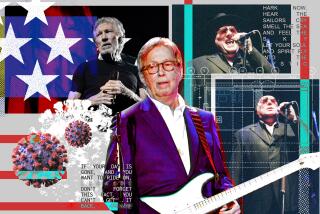When Innocence Died and Marketing Set In : Woodstock: The anarchic celebration proved the size of the new youth audience and corporate rock was born.
- Share via
I remember Woodstock. And, true to the joke that if you remember Woodstock you weren’t there, I wasn’t.
In 1969, I was 13 and living in England. We moved to America in ’71 and I discovered rock ‘n’ roll in the echo of Woodstock. Woodstock was a state of being for me rather than an event, something usefully surreal rather than actually real. It validated how we young people saw ourselves. It was our Appomattox, where the “Father Knows Best” generation surrendered to its youth.
Woodstock was also the alpha and omega of rock ‘n’ roll: the simultaneous death of its innocence and the birth of the corporate rock era. Hundreds of thousands of people overwhelming the few, thin vestiges of order--ticket prices, fences, crowd control, highway patrolmen--demonstrated that rock ‘n’ roll was huge business, much larger than anyone had realized. Woodstock was triumphant anarchy, benign as it turned out, but anarchy nonetheless. And if business could just bottle that . . .
And bottle it they did. “They” being the record industry, whose breadwinners at the time were as much Frank Sinatra and Andy Williams as the Beatles and Rolling Stones. Rock ‘n’ roll, huge only to its constituency, was equivalent then to the alternative music of two years ago. But Woodstock changed all that, rapidly. Kids became not the enemy but the market.
In 1969, FM radio was virtually underground. Innovative rock ‘n’ roll found a welcome there and settled into its new, and to begin with barren, homeland. In ‘71, FM radio was still fresh, experimental, gushingly enthusiastic, naive and fantastic. Every day, FM radio ran out of hours, not music. I’m not talking about today’s classic rock, which is virtually just reheated AM radio, the silt of a great musical era. I’m talking about a spirit of musical diversity that was doomed as soon as the culture’s commercial value could be accurately ascertained. Because once radio stations became hot properties, they sold for ever larger prices, and their owners became proportionately conservative to the size of their debts.
I used to listen to Allison Steele on WNEW, New York’s legendary pioneer FM station. She called herself the “Night Bird.” She came on at midnight, read a different poem every night and talked for the first 15 minutes of her show before she played her first song. The mystical Zac on rival WPLJ was radio’s Merlin, and WNEW’s Jonathan Schwartz was FM’s preeminent philosopher. In L.A., it was KMET that played the same pioneering music and shaped pop culture. The early DJs were passionate and as wide-eyed as their invisible audiences about this new music and unfolding society. Once, I tuned into Schwartz’s show as he was asking listeners to tell him whether he should play Sinatra along with, say, King Crimson. The listeners voted yes. It was all that open then.
Woodstock died at Woodstock, just as the spark disappears with the ignition. Woodstock ’94 is a form of virtual reality--a harmless, musical Jurassic Park. The music may or may not be good, or worth the $135 that the tickets cost, but the vibes are synthetic, the echo a licensed sample. Woodstock in ’69 was a unique, unrepeatable moment. It was spontaneous and organic. Its significance came from a generation discovering its own voice, though that ephemeral weekend was also the last time that generation was the sole owner of its own voice: Big business quickly bought in.
I’m not cynical about Woodstock ‘94, and I’m no more sentimental about times gone by than I am about, say, my sixth birthday. But overlooked in the generational dispute about the meaningfulness of the original Woodstock is the fact that it was the biggest happy accident in history. There’s no sequel to that.
More to Read
The biggest entertainment stories
Get our big stories about Hollywood, film, television, music, arts, culture and more right in your inbox as soon as they publish.
You may occasionally receive promotional content from the Los Angeles Times.










